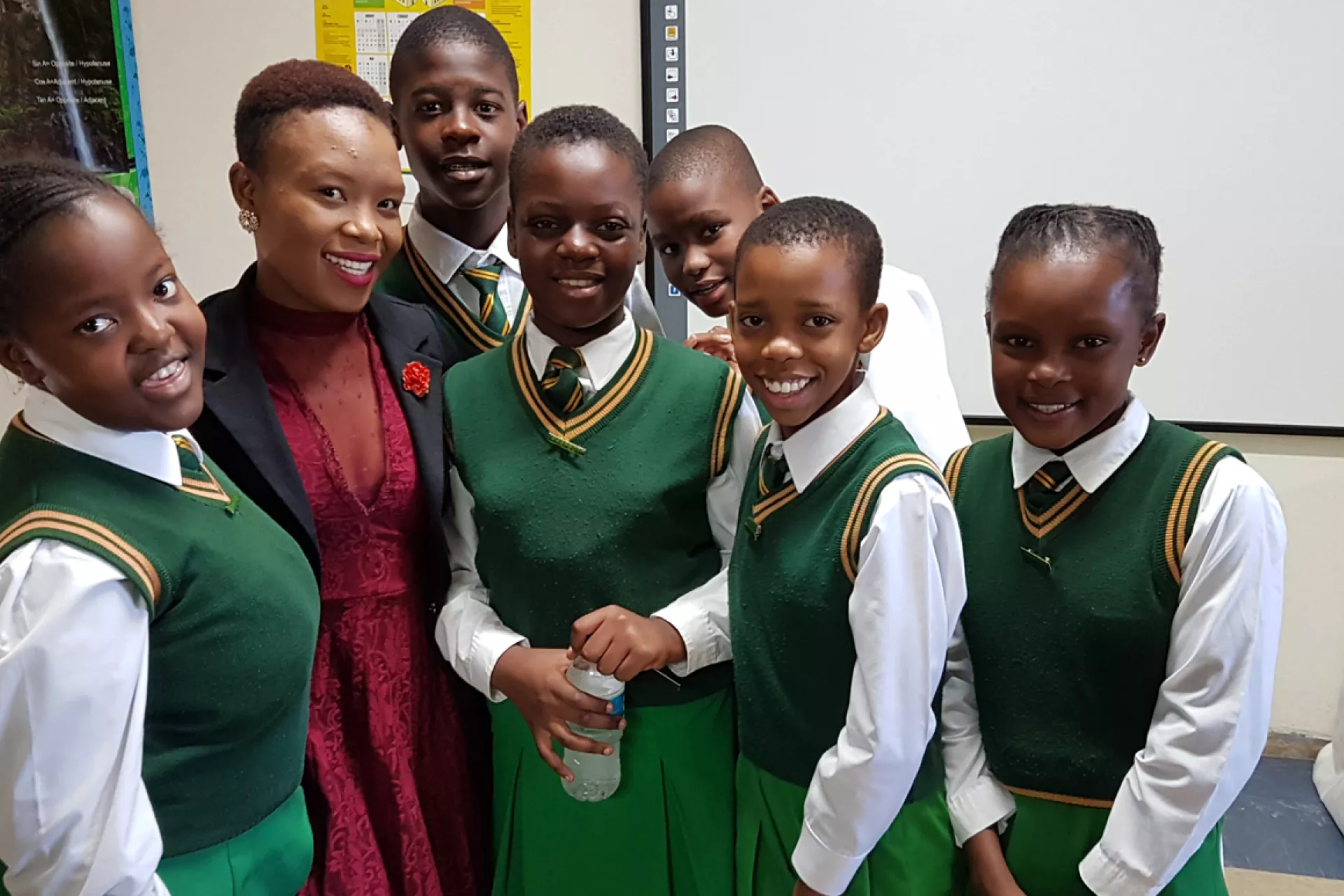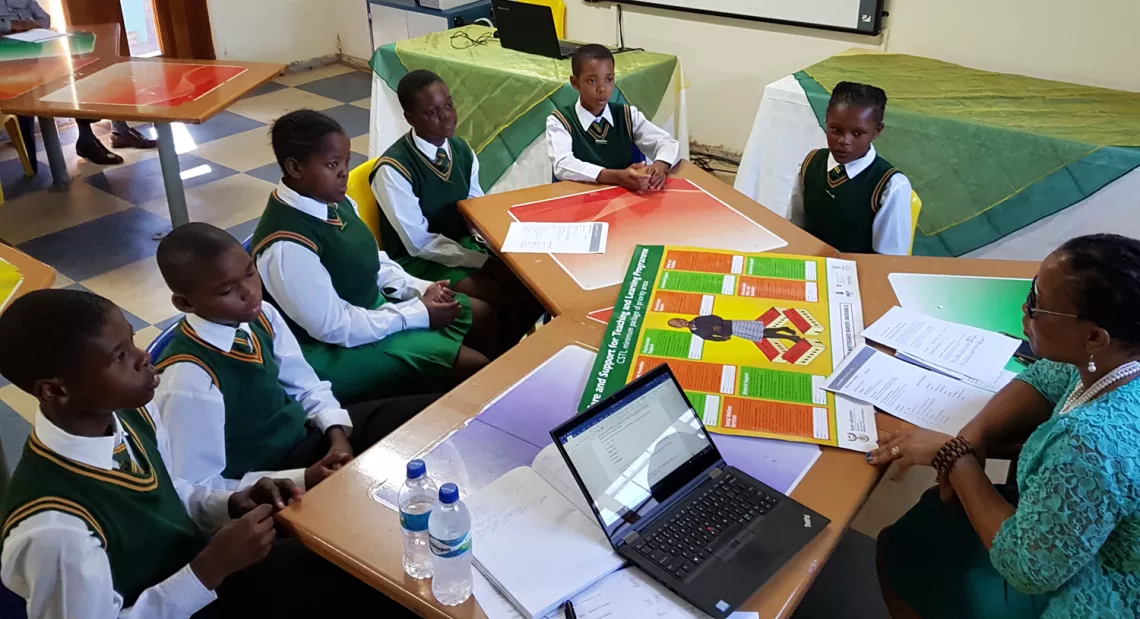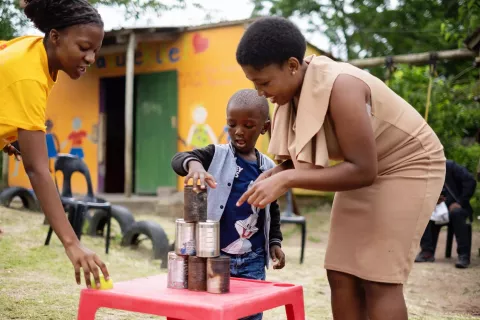Supporting healthy, happy children
Care and support for teaching and learning

LEKAZI, South Africa: “Our future depends on the education we get,” proclaims seven-year-old Shanell Nkosi as she explains the positive impact of a UNICEF-supported programme on her learning experience.
The testimony of Shanell is impetus for UNICEF’s active promotion of the Care and Support for Teaching and Learning (CSTL) programme in hundreds of schools throughout South Africa. Implemented by MIET, a key UNICEF partner in South Africa, CSTL has two key functions: mainstreaming care and support throughout the education system and coordinating the many care and support activities delivered in and through schools.
Opportunity for children to reach their full potential
Shanell is a learner at Tenteleni Primary School located in South Africa’s eastern Mpumalanga province and is one of hundreds of schools throughout the country that are actively implementing CSTL, with tangible, positive results. The bright green and yellow walls of Tenteleni Primary match the colours on the UNICEF-funded CSTL poster which clearly detail the pillars of the CSTL programme and which are mounted throughout the school.
With 1108 learners from Grades R to 7, Deputy Principal Joseph Matsheka explains how CSTL has helped transform his school into an inclusive centre of learning, care and support as it addresses issues that negatively impact the learning experience of children. In doing so, he notes, “CSTL provides the opportunity for children to reach their full potential”

Better support for vulnerable children
“In the past”, explains Deputy Principal Matsheka, “vulnerable learners were known to us but not supported but now, thanks to CSTL, we are able to give them support". The challenges faced by both learners and educators in this under-resourced community range from poverty to HIV, and substance abuse to child-headed households. “This programe has opened our eyes” he elaborates, “as the 10 priority areas allow us to differentiate between the needs of the learners as we have learners who are vulnerable and lack adequate support and protection.”
Thandekile Mawela provides a critical role as the Learner Support Agent (LSA) and ensures tracking of vulnerable learners and data is regularly captured. She speaks of the deprivation faced by some children who do not have a meal at home. With this in mind, CSTL provides educators with the means to track children in need and that they are provided with soft porridge in the morning (in addition to a meal provided through the Governments Feeding Scheme). Where possible, children are provided with food to take home and they are encouraged to have balanced meals. Foundation Phase teacher Phumzile Sibiti informs us that the children, thanks to the implantation of CSTL, “now know that they must eat fruit and vegetables (from the schools vegetable garden) and proteins which they did not know before.” The message has clearly resonated with seven-year-old Charity who states emphatically that at she has a “no junk food rule” at home and discourages her fellow learners from unhealthy eating.
“Vulnerable learners were known to us but not supported but now, thanks to CSTL, we are able to give them support" - Deputy Principal Matsheka.
The construction of a handwashing station – sanitation is key component of CSTL - has ensured that hygiene and health levels are enhanced at the school level. The ritual of washing hands is now an important part of the day as is the brushing of teeth. With UNICEF assistance, soap, toothbrushes and toothpaste have been provided to the school. These practices have led to lower absenteeism and healthier children at the school. Fikile Mathebula is the Inclusive Education Coordinator and she credits CSTL for these benefits and adds that “parents are being conscientised by their children on hygiene practices.”
Enhancing teaching skills and improving safety and protection
Doris Phiri, a Foundation Phase teacher, explains that the CSTL training manual has enhanced her teaching skills and notes that “we are open to the learners and they trust us because we are an inclusive school [and] we must have a positive attitude and address the diversity and then build the trust with the learners.” She further credits CSTL for clearly highlighting the needs of learners as indicated through the Minimal Standards, including that of Safety and Protection. To address road safety, teachers were tasked with assisting learners to cross the road and then senior learners were trained to do scholar patrol.
In addition to physical security, psychosocial support is highlighted in the CSTL. Fikile explains that the school works in consultation and the help of councilors and social workers is solicited as NGOs and partners are invited to assist learners who are facing challenges. With regard to safety and protection, the school has “adopted” a nurse and a policeman who pay special attention to Tenteleni.

Fikile Mathebula describes the School Based Support Team as “the engine of the school” and is tasked with making sure that every learner has stationery and that they adapt curriculum to assist children with special needs such as visually challenged and gifted children. Workshops are held in the school and capacity building skills support neighbouring schools. This is filtered down to the learners as they too are involved in providing peer support which did not happen before. This is verified by eight-year-old Charles Philane who believes that CSTL teaches him to “accept everyone, not bully anyone and not be unfair.” Seven-year old Prince Nkosi agrees and adds that he likes the CSTL programme as “it teaches you that you have to care to for others and to be cared for.”
CSTL includes promoting extra-curricular activities and at Tenteleni this includes playing musical instruments like the marimba, learning to play chess and encouraging sport. The school maintains ongoing engagement with parents and is actively involved in outreach with local community organisations and businesses.

Making a meaningful difference
To help break the cycle of poverty, the school works with the Department of Social Development to ensure that all deserving learners receive the Child Support Grant. Infrastructure support is a key pillar of CSTL and in this regard Tenteleni has seen the construction of three toilets for learners with disabilities in early 2018. A walk around the school with its tidy classrooms and clean toilets shows the well-maintained facilities.
At the academic level, data capturing through CSTL shows that learner performance has improved since the implementation of CSTL in 2016. There is now a monitoring tool for learners facing challenges and the school now has a well-used library. In addition, CSTL provides for a Subject Improvement Plan which ensures that educators come up with intervention strategies including homework assistance, afternoon classes and the identification of gaps.
Mpho Khasake, Programme Manager at MIET explains that CSTL is “a necessity that leads to improved learning outcomes.” The impact of this necessity is plainly evident at Tenteleni Primary School where the testimonies are proof of the meaningful difference being made. Mpumalanga, the province in which this school is located translates into “land of the rising sun” so it is fitting that Tenteleni is generating a class of rising young leaders.




